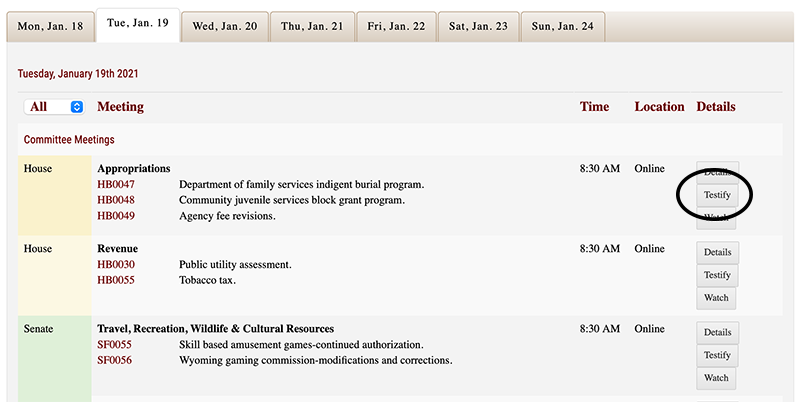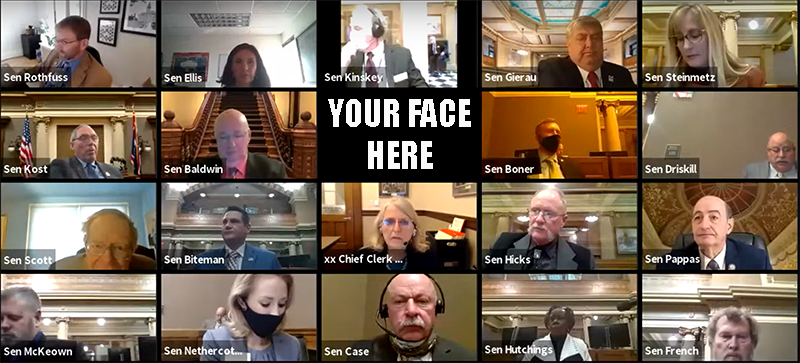A user’s guide to the bizarre, online 2021 Wyoming legislative session
The Wyoming Legislature’s 2021 general session kicked off this week … sort of.
State lawmakers “gaveled in” virtually on Jan. 12, via Zoom, to figure out rules and procedures for what will certainly be the weirdest session in recent history. No further action took place this week.
Some lawmakers attended Tuesday’s proceedings at the capitol in person. Along with a handful of “patriot” spectators in the gallery, most of these officials didn’t wear masks despite an ongoing statewide public health order.
In general, legislators hate the idea of the session taking place via Zoom. It degrades the types of interpersonal interactions that are critical for the sensitive process of policymaking.
But for the rest of us, a virtual session provides a major benefit: access. Whether you’re a lobbyist or concerned resident, you can tune in to the proceedings from your kitchen via YouTube or even provide public testimony via Zoom instead of driving to Cheyenne.
Plus, given many of our neighbors’ and legislators’ attitudes toward COVID-19, a virtual session provides the added bonus of not having to sit in a cramped capitol committee room next to someone who believes that mouth-breathing on you during a pandemic is his constitutional right.
Unprecedented opportunity
The plan for the session, currently, is that lawmakers will meet virtually over several short periods of time during January and February. Then, on March 1, if conditions allow, they will begin to meet in person at the capitol.
At this point, even technology-challenged lawmakers and under-resourced tech support crews have online meetings pretty well dialed in.
An in-person session beginning March 1 is probably wishful thinking, however. COVID transmission rates remain high in the state, and plans to accelerate vaccine distribution are running up against overwhelming demand.
It’s hard to imagine a massive public health improvement between now and March.
Whatever happens, the Legislature has been meeting virtually in interim committees since last spring, and even technology-challenged lawmakers and under-resourced tech support crews have online meetings pretty well dialed in.
So for the next couple months, at least, the general public will have an unprecedented opportunity to “attend” the legislature’s general session and participate in the process.
A big first week: oil tax breaks, killing solar, education cuts
Legislative committees will begin to meet via Zoom next week, Jan. 19 – 21, to consider bills they already worked on during the interim session. The committees will listen to public comment, amend the bills, and vote to either advance or defeat them.
A virtual session provides the added bonus of not having to sit at the capitol next to someone who believes that mouth-breathing on you during a pandemic is his constitutional right.
These “committee-sponsored” bills that will be heard during this first week are, the thinking goes, closer to their final drafts than others that will be introduced later by individual lawmakers. So, committees figure they can get them out of the way first.
That doesn’t mean the bills during this initial period aren’t controversial or problematic. Here’s a handful:
- A bill that would cut $100 million from public school funding, HB-61, will come before the House Education Committee during its 1:30 p.m. meeting on Wednesday.
- SF-16, which would effectively kill rooftop solar power generation in Wyoming, will come before the Senate Corporations Committee during its 8:30 a.m. meeting on Tuesday.
- Also on Wednesday, a bill to give even more tax breaks for the oil and gas industry, HB-11, will come before the House Minerals Committee during its 8 a.m. meeting.
The legislature’s website gives a day-by-day breakdown of the committees’ schedules and the bills they hope to address next week.
After this three-day spree, the bills that the committees advance will go before the full legislature during an eight-day mini-session beginning Jan. 27. These proceedings, which are almost certain to be a circus, will be viewable via the Legislature’s YouTube channel.
So you wanna tell lawmakers what you think? Here’s your chance!
Next week’s committee meetings will provide excellent opportunities for Wyoming residents to give public comment.
Do you think Wyoming shouldn’t further slash school funding? Or kill rooftop solar? Do you think last year’s tax breaks were enough for the oil industry? Tell it to the legislature!
In order to testify via Zoom, you’ll need to sign up. Here’s how:
- Go to the legislature’s online calendar
- Find the meeting where the bill you care about will be considered
- Click on the “testify” button for that meeting
- Enter your name and email in the form that follows

You’ll receive an email from the Legislative Services Office with login information to the Zoom meeting. When the time comes, login to the meeting using Zoom. You’ll be put in a “waiting room” until you’re let into the meeting. When the public comment segment of the meeting comes, speak your mind.
Or tell ’em in writing!
After the initial committee meetings next week and the eight-day mini-session Jan. 27 – Feb. 5, the legislature will take a break. Committees won’t convene again until Feb. 22.
This gives folks a two-week period to go through the full list of bills (updated daily) and to submit written comments to the legislature.
You can submit a comment on a particular bill by clicking on its bill number (HB0002, for example) in the left-hand column of the bill list. Then, in the row of tabs at the top on the next screen, go to the “Comment” tab and click “Submit a comment” at the bottom. That will take you to a form where you can let lawmakers know whether you support or oppose a bill, and why (within a 140-word limit).
Of course, you can contact your own local state legislators to let them know how you feel about particular legislation, or the state of things in general! If you don’t know who your local state lawmakers, the easiest way is to enter your address in Open States’ handy dandy legislator finder.






